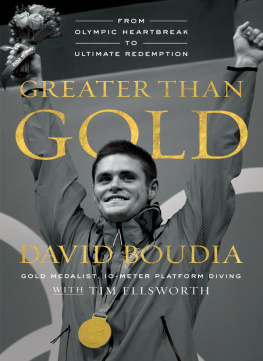
Praise for Redemption
Redemption is a story of adversity and success. A story that emphasizes process over outcome. I have had the opportunity to go through the process with Bryan and enjoy the outcomes.
It has been a blessing to me, as a coach, as a man, and as a father, to watch Bryan at the mountaintops, in the valleys, and on the podium. Sometimes we are not aware of the situation we are in until time gives us perspective. As I look back on the journey, I now have a unique opportunity to see from Bryans perspective.
Redemption is a story that can speak to us all and shows that if we allow God to work and give Him the opportunity to be a part of the process, we will be satisfied with the outcome.
Kevin Reid
Azusa Pacific University
Track and Field
Bryan Clays Redemption is a remarkable story of a young man who overcomes great odds through the strength of his faith, commitment, and willpower. He is an example to young people everywhere that commitmentsto faith, sport, academics, or any other pursuitcan be realized when you believe its possible and give it your all.
Ralph S. Blackman
President and CEO
The Century Council
I believe there is power in a shared life, which is why I am so excited about Bryans book. He has a story that we all can learn from and be empowered by. Redemption is full of gems of wisdom and insight into one of the best athletes in the world, who also has a spirit to match his athletic capabilities.
Ryan Hall
Olympic marathon runner and cofounder, The Steps Foundation
For Bryan Clay, track and fieldand the decathlon in particularbecame his oasis. Bryans willingness to be brutally honest about his early childhood problems and the instructions he internalized along the way are alone worth the read. Redemption offers personal and mature lessons on relationships, love, self-doubt, working through disappointment, success and failure, and commitmentnot only to his sport but to his God. This book will make all readers part of Bryans extended familyhis ohana.
Frank Zarnowski
NBC Olympic analyst, sports commentator, and author,
American Decathletes
REDEMPTION
A Rebellious Spirit, a Praying Mother, and
the Unlikely Path to Olympic Gold
Bryan Clay
with Joel Kilpatrick

2012 Bryan Clay
All rights reserved. No portion of this book may be reproduced, stored in a retrieval system, or transmitted in any form or by any meanselectronic, mechanical, photocopy, recording, scanning, or otherexcept for brief quotations in critical reviews or articles, without the prior written permission of the publisher.
Published in Nashville, Tennessee, by Thomas Nelson. Thomas Nelson is a registered trademark of Thomas Nelson, Inc.
Thomas Nelson, Inc., titles may be purchased in bulk for educational, business, fund-raising, or sales promotional use. For information, please e-mail SpecialMarkets@ThomasNelson.com.
Unless otherwise noted, Scripture quotations are taken from the Holy Bible, New Living Translation. 1996, 2004, 2007. Used by permission of Tyndale House Publishers, Inc., Wheaton, Illinois 60189. All rights reserved.
Scripture quotations marked NKJV are from the New King James Version. 1982 by Thomas Nelson, Inc. Used by permission. All rights reserved.
Library of Congress Cataloging-in-Publication Data
Clay, Bryan, 1980
Redemption : a rebellious spirit, a praying mother, and the unlikely path to Olympic gold / Bryan Clay with Joel Kilpatrick.
p. cm.
ISBN 978-0-8499-4827-5 (hardcover)
1. Clay, Bryan, 1980- 2. Olympic athletes--United States--Biography. 3. Decathletes--United States--Biography. I. Kilpatrick, Joel. II. Title.
GV697.C62A3 2012
796.092--dc23
[B]
2011042725
Printed in the United States of America
12 13 14 15 16 QG 5 4 3 2 1
CONTENTS
Every second, every centimeter counts in the decathlon. Blow an event once, and you just might hand your next-closest competitor a ticket to the Olympic Games.
It was forty-one days before the 2008 Olympics in Beijing, China, and it seemed as if I was about to give away my only chance to get there. I had come into the Olympic Trials in Eugene, Oregon, a heavy favorite. But my performance so far was more Junior Olympics than Olympic gold medalist. One more mistake and I might as well count myself out of the Beijing Olympics altogethermissing the dream I had pursued most of my adult life.
Not another 1992, I kept thinking. Please, God, dont let this be another 1992.
The famous Dan and Dave decathlon debacle occurred during the 1992 Trials. Dan OBrien, a favorite to medal, had failed to get a score in the pole vault. He was the best decathlete at that time, and hed had a good meet going until the pole vault. Then that one bad event at Trials caused his 1992 Olympic hopes to vanish. This came after a huge public relations campaign by Reebok, which broadcast Dan and Dave (Johnson) commercials all over television to elevate the competition between the two premier athletes leading up to the games. Even more painful was that just a few weeks after losing at the Trials, Dan set a world record for points in a decathlon in France. His 8,891 points beat the Olympic gold medalist Robert Zmelik by 547 points.
Any athlete knows this hard fact about the Trials: its all or nothing. U.S. track and field athletes have to place in the top three and meet the Olympic standards to go to the Olympics. Miss one or the other, and you wont go. Have an off day in just one event, and you probably wont go. That is why the U.S. Olympic team is widely considered the toughest team in the world to make. There are only three openings in each event, and athletes are not chosen by a prior ranking system. It doesnt matter how well you performed the previous month, the previous year, or over the course of your lifetime. You have to show up on that day and be the best. Period.
Now I might be humbled the same way that Dan OBrien had been.
My performance was far from what I had expected. I had gotten to Eugene a week early to practice, and everything had gone well. Better than well. I had landed a massive jump during practice, flying 7.70 meters (25 feet 3 inches) from a short approach, meaning I had taken half the number of steps I usually take. That is huge for a decathlete. I felt great mentally, physically, emotionally, and spiritually. All the commentators, coaches, and athletes expected me to crush the field. And to be honest, that was weighing on me. I wanted to live up to their expectations. I wanted to make the team again, as I had in 2004. I had narrowly missed a gold then in what was the most competitive and high-scoring decathlon in the modern history of the games. Now I was hungry to nab the gold.
But by the time the Trials started, my great practices were a memory.
The long jump was a nightmare. The 25 feet I had jumped in practice seemed as if it had never happened. My body didnt soar or fly; it thudded7 meters 39 centimeters, a full 15.5 inches shorter than what I had hoped for. I stepped out of the sand pit with a terrible feeling in my stomach, knowing that I had just made it even more difficult for myself to win. Other guys were having really good meets, walking around the practice area smiling, heads up, confidently preparing for the next events. Thoughts that I was already vanquished kept shooting through my brain and making it harder for me to concentrate on what I needed to do.
Next page











